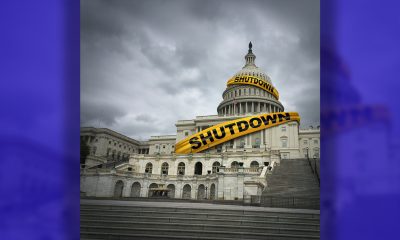California Black Media
California Legislature Fails to Pass Concealed Firearm Law on a Technicality
As gun violence plagues the country, the tug-of-war between gun rights and gun regulations on a local and national level will likely continue. Although California has some of the toughest gun laws in the country, the Legislature has yet to find a solution for concealed carry permits.

By Maxim Elramsisy | California Black Media
On the last night of this year’s legislative session last week, the State Assembly rejected Senate Bill (SB) 918, authored by state Sen. Anthony Portantino (D-La Cañada Flintridge). The bill — written to strengthen restrictions on concealed firearm permits — was one of several bills the Legislature did not approve during the tension-filled finale to a session marked by pointed debate among members of the Assembly’s Democratic majority.
Before the final vote, supporters of the legislation added an Urgency amendment so it could go into effect immediately — instead of Jan. 1, 2023, when bills passed during the current legislative session take effect.
As an Urgency Measure, SB 918 required 54 votes in the Assembly to pass, rather than the usual 41. The bill received 53 votes which is more than enough votes needed to reach the Governor’s desk had the urgency amendment not been added.
Last June, the Supreme Court of the United States ruled in New York State Rifle & Pistol Association v. Bruen that “may carry” laws giving states discretionary authority to reject concealed carry permits violated the Second Amendment. The decision rendered California’s law requiring applicants to show “good cause,” or a justifiable reason for needing such a permit unconstitutional.
In his opinion on the case, Justice Clarence Thomas, wrote that states could still prohibit guns in “sensitive places.” Chief Justice John Roberts, joined by Justice Brett Kavanaugh, wrote in a concurring opinion that the ruling did not affect “shall issue” laws requiring objective licensing requirements such as “fingerprinting, a background check, a mental health records check, and training in firearms handling, and in laws regarding use of force, among other possible requirements.”
SB 918 complies with the Supreme Court ruling by designating courts, places of worship, zones around schools, hospitals, public parks, libraries, airports, public transportation and bars as sensitive places. The bill requires authorities to review publicly available statements including social media to assess whether applicants present a danger to the public.
Applicants would be required to submit to in-person interviews to ensure they are “qualified,” and licensing officials will be required to interview at least three-character references. The state would also give licensing officials, usually a sheriff’s office, greater ability to revoke a license.
Initially, leaders believed that the measure had enough support to pass with an urgency amendment allowing it to go into effect this month. After the bill passed the Senate with a super majority (2/3) of the votes, it failed to gain a super majority vote in the State Assembly. Seven Democratic Assemblymembers voted against the bill or abstained from voting.
Notably, two Democratic members, Adam Gray (D-Merced) and Rudy Salas (D-Bakersfield) who are running for Congress in swing Central Valley districts may have felt the possibility of a political backlash by supporting gun control measures. Retiring Assemblymember Patrick O’Donnell (D-Long Beach), voted against the measure, though he was expected to support it.
“I’m very disappointed in the outcome,” the bill’s author, Portantino, told California Black Media. “But for one assembly member who switched their vote from aye to no, we would have had the 54 votes. I plan on reintroducing the bill on Dec. 5. I’ve already spoken to the governor and the Attorney General.”
If it had passed, the bill was likely to face legal challenges because many critics believe that it is too restrictive. The requirement of interviews and character references are points of contention for gun rights groups.
For Gov. Gavin Newsom, prioritizing gun control measures is still a leading priority in this legislative term, responding to an uptick of gun violence across the country. As of Sept. 2, the Gun Violence Archive reports 450 mass shootings in 2022, compared to 417 in all of 2019.
“California has the toughest gun safety laws in the nation, but none of us can afford to be complacent in tackling the gun violence crisis ravaging our country,” said Newsom. “These new measures will help keep children safe at school, keep guns out of the hands of dangerous people and responsibly regulate the sale of firearms in our communities.”
Though defeated in this attempt to regulate concealed firearms, Newsom has a number of notable legislative victories, including AB 2571, which restricts the marketing of firearms to children and AB 1594, which strips gun manufacturers of some legal protections when their products are used to commit acts of violence. SB 1327 and AB 1621 target ghost guns by restricting their manufacture, transportation and sale and close the loophole that allowed sale of incomplete and unserialized “firearm precursors.”
As gun violence plagues the country, the tug-of-war between gun rights and gun regulations on a local and national level will likely continue. Although California has some of the toughest gun laws in the country, the Legislature has yet to find a solution for concealed carry permits.
“Together, all of the gun laws that we passed make California safer,” Portantino said, “though not having a CCW (concealed weapons permit) consistent with the Supreme Court decision hurts California, which is why I’m committed to bringing it back on Dec. 5.”
Activism
Oakland Post: Week of November 26 – December 2, 2025
The printed Weekly Edition of the Oakland Post: Week of November 26 – December 2, 2025

To enlarge your view of this issue, use the slider, magnifying glass icon or full page icon in the lower right corner of the browser window.
Activism
Oakland Post: Week of November 19 – 25, 2025
The printed Weekly Edition of the Oakland Post: Week of November 19 – 25, 2025

To enlarge your view of this issue, use the slider, magnifying glass icon or full page icon in the lower right corner of the browser window.
Activism
How Charles R. Drew University Navigated More Than $20 Million in Fed Cuts – Still Prioritizing Students and Community Health
Named after the pioneering physician Dr. Charles R. Drew, famous for his work in blood preservation, CDU’s mission is to cultivate “diverse health professional leaders dedicated to social justice and health equity for underserved populations through education, research, clinical service, and, above all, community engagement.”

Charlene Muhammad | California Black Media

Earlier this year, when the federal government slashed more than $20 million in grants to Charles R. Drew University of Medicine and Science (CDU), the leadership of California’s only historically Black medical school scrambled to stabilize its finances — while protecting its staff and students.
Named after the pioneering physician Dr. Charles R. Drew, famous for his work in blood preservation, CDU’s mission is to cultivate “diverse health professional leaders dedicated to social justice and health equity for underserved populations through education, research, clinical service, and, above all, community engagement.”
The school is widely recognized as a vital pipeline for Black doctors and other health professionals throughout California.

Dr. David Carlisle (center), President of Charles R. Drew University of Medicine and Science (CDU), with two of the university’s students. Photo Courtesy of Charles R. Drew University of Medicine and Science.
Dr. Jose Torres-Ruiz, CDU’s Executive Vice President for Academic Affairs and Provost, said the university—designated as a Historically Black Graduate Institution (HBGI)—was notified in early March 2025 that most of its major grants, including the Research Centers in Minority Institutions (RCMI) award, known at CDU as the “Accelerating Excellence in Translational Science” (AXIS Grant), would be terminated. Initially renewed, the grant was later revoked because its language did not align with the current federal administration’s priorities.
The AXIS Grant provides $4.5 million per year for five years through the National Institutes of Health’s National Institute on Minority Health and Health Disparities. CDU quickly reallocated other funds to protect its scientists, staff, and technicians, though some personnel losses were unavoidable.
“We didn’t want to fire them because these people have expertise that takes years to gain,” Torres-Ruiz said.
The grant is crucial, he added, funding research in cancer, diabetes, and metabolic diseases that affect the Willowbrook community in South Los Angeles, training the next generation of scientists, and supporting community outreach.
Programs at the school, including its youth and teen mentoring programs reach beyond the walls of the university, impacting the lives and quality of health care of people in the surrounding community, one of the most underserved areas in Los Angeles County.
Confronted with the harsh reality of funding cuts, the university’s leadership made an early, strategic choice to honor its foundational commitment and prioritize its students. Dr. Deborah Prothrow-Stith, dean of CDU’s College of Medicine, highlighted the school’s deliberate focus on admitting students from economically disadvantaged backgrounds — many of whom are Pell Grant recipients and graduates of public high schools.
“We are staying true to our mission, finding creative ways to prioritize what’s most important,” she said. “I’m optimistic because of our students—they are dedicated and committed to service.”
In addition, the $2 million-per-year John Lewis NIMHD Research Endowment Program, intended to strengthen CDU’s research infrastructure, was terminated with three years remaining after a February 2025 freeze on nearly all federal grants for public health, education, and infrastructure projects.
Following an appeal, CDU learned in June that the RCMI grant had been fully reinstated, along with all but eight smaller grants. The university’s next priority is restoring the John Lewis Endowment.
“We are working with NIH staff to adjust the language. Certain words like ‘diversity’ and ‘equity,’ which are core values of our institution, are now under scrutiny,” Torres-Ruiz explained.
CDU has also expanded funding sources by targeting foundations and private donors. “This may happen again. We cannot rely solely on federal agencies,” Torres-Ruiz said, emphasizing the importance of building relationships with politicians and private partners.
Prothrow Stith echoed Ruiz’s perspective on cultivating multiple funding sources. “Building bridges with private foundations helps, but it doesn’t erase the disruption,” she said.
Many students rely on federal loans, CDU leaders say. Those loans are now capped at $150,000. So, most medical students graduate with $300,000–$350,000 in debt when accounting for tuition and living expenses.
To lower the burden on students, CDU is exploring options to make education more affordable, including overlapping school years to reduce annual costs.
Students like Isaiah Hoffman and Bailey Moore epitomize CDU’s values.
Hoffman, an aspiring orthopedic surgeon from Inglewood, credits Drew for inspiring his career choice. Out of 12 medical school acceptances, he chose CDU to give back to his community and continue Drew’s legacy. Hoffman also founded H.O.M.I.E.S. Inc., a nonprofit pairing Black K–12 students with mentors to support academic and personal growth.
Moore, 23, from Southeast Washington, D.C., pursued CDU to address maternal health disparities she observed in her own community – an underserved area of the nation’s capital city. “CDU pours into you. It emphasizes service, and I hope for a world without health disparities,” she said. “Drew may be small, but Drew is mighty. It was created out of necessity to save lives and empower communities.”
CDU President and CEO Dr. David Carlisle acknowledged during the Aug. 28 “State of the University” that the institution faces ongoing challenges. Political threats and grant disruptions contributed to a sizable unrestricted budget deficit, despite achievements over the past year.
Successful appeals and alternative sources of funding, led by Vice Provost Dr. Ali Andallibi, have now restored all the monies previously lost in research funding, he said.
Carlisle expressed gratitude to L.A. Care Health Plan and Sutter Health for providing multimillion-dollar scholarships and highlighted that CDU would welcome approximately 1,050 incoming students—near its highest enrollment ever. “I’m deeply grateful for the resolve, diligence, and unwavering commitment of everyone here, even when the path is not easy,” he said.
At the gathering, Carlisle referred to the sounds of ambulances passing by with blaring sirens as- the “music of healthcare,” while students and the school’s leadership attending expressed resilience in their speeches and conversations. The activities of the day captured the institution’s focus on education, service and advancing health care across disadvantaged communities in California – and beyond.
Video Report: How Charles Drew Stayed Strong Amid Federal Funding Cuts
-

 Activism3 weeks ago
Activism3 weeks agoOakland Post: Week of November 12 – 18, 2025
-

 Activism4 weeks ago
Activism4 weeks agoOakland Post: Week of November 5 – 11, 2025
-

 Activism2 weeks ago
Activism2 weeks agoIN MEMORIAM: William ‘Bill’ Patterson, 94
-

 Activism3 weeks ago
Activism3 weeks agoHow Charles R. Drew University Navigated More Than $20 Million in Fed Cuts – Still Prioritizing Students and Community Health
-

 #NNPA BlackPress3 weeks ago
#NNPA BlackPress3 weeks agoThe Perfumed Hand of Hypocrisy: Trump Hosted Former Terror Suspect While America Condemns a Muslim Mayor
-

 Bay Area3 weeks ago
Bay Area3 weeks agoNo Justice in the Justice System
-

 #NNPA BlackPress3 weeks ago
#NNPA BlackPress3 weeks agoProtecting Pedophiles: The GOP’s Warped Crusade Against Its Own Lies
-

 #NNPA BlackPress2 weeks ago
#NNPA BlackPress2 weeks agoTrump’s Death Threat Rhetoric Sends Nation into Crisis

























































